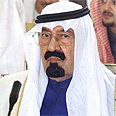
The marriages were primarily political and aimed at establishing the kingdom. Each wife came from a different tribe, small and large, and the sons born to the king by the women of these tribes were deemed as the tribe's shares in the new order of the kingdom known as "Saudi Arabia."
Subsequently, there are thousands of princes and royal family members in Saudi Arabia today. But this led to a problem: Who would succeed the throne after Abdul Aziz? Namely, which tribe?
King Abdul Aziz came up with an idea: The throne would pass from one son to the next according to their biological order of birth. Namely, the eldest would reign first, and when he passes away the next in line would succeed the throne. This way every tribe would get the right to rule, not according to its level of importance or size, but rather according to chronology.
All the tribes agreed to this arrangement. Thus, the monarchy in Saudi Arabia passed from brother to brother and not from father to son.
Yet in reality, there were some women who were held in higher esteem than others. The most esteemed mother was Hassa Sudairi who also came from Saudi Arabia's largest tribe, the Sudairi Tribe, and therefore her offspring were deemed more important than their brothers.
Eventually they took over the kingdom. Among the most prominent sons are Faisal and Fahd, the Internal Security Minister Crown Prince Sultan Nayef and others. The sons of the latter are also deemed more important: For example, Saudi Foreign Minister Saud al-Faisal, the son of King Faisal; or Bandar Bin Sultan, son of Crown Prince Sultan, the former ambassador to Washington and today a key figure, among others.
Saudi Arabia had to a great extent become "the Sudairi connection" in the royal court.
Because the reign was passed between the brothers, the figures concerned had aged. King Abdullah is 84-years-old. Crown prince Sultan, the youngest, is 80–years-old. This matter is of great concern to the family in Saudi Arabia.
And here a mishap occurred. King Fahd was to succeed Crown Prince Abdullah, the current reigning king, who is not a Sudairi. Fear struck them all: The Sudaries feared that he would crown his son and annul their power. Abdullah feared the Sudairi clan would harm him in some way. The system was unstable.
What did Israel gain?
Abdullah sought a solution to the quandary. Who would save the order of succession in the monarchy? – Israel of course.
At the beginning of 2002, when Crown Prince Abdullah met with Jewish journalist Thomas Freidman from the New York Times at his farm in Jeddah, he laid out before him what came to be known as the Saudi Initiative.
Saudi Arabia would be prepared to recognize and to normalize ties with Israel in exchange for comprehensive Israeli withdrawal from areas occupied after 1967, and vague recognition of the Palestinian refugee issue, or in other words: A just solution to the Palestinian question.
Freidman published the initiative as the newspaper's main headline. The American Administration was shocked. They had supported the Sudairies all along, and suddenly Abdullah, who is not a Sudairi, was willing to recognize Israel! The Americans, who were excited at the development, shifted their support from the Sudaries to Abdullah; namely they sponsored him.
That’s how Abdullah assured himself the crown, and that's how the question of succession subsided, and that's how the Saudi rule stabilized. In the deal struck between the princes it was ensured that the monarchy would skip over a few brothers and that it would return to the bosom of the Sudairies with Crown Prince Sultan, himself the defense minister.
The wise Abdullah knew that Israel would reject the initiative immediately, and that's exactly what happened. He had already benefited from the move and didn't risk anything. But what did Israel gain?















